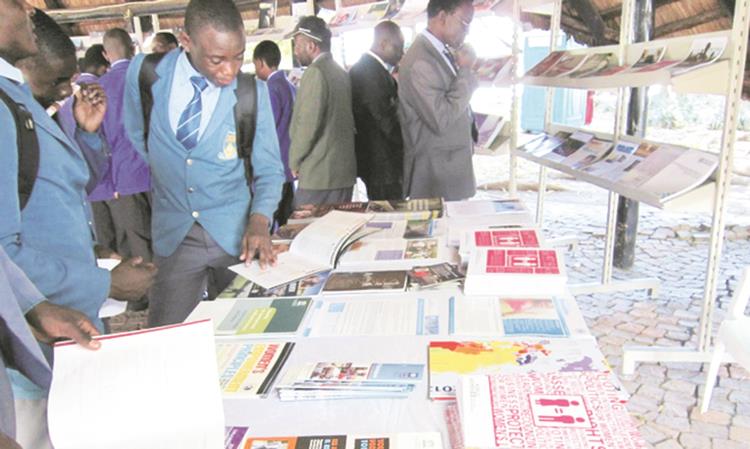ZIBF: What’s new in 2016?

Stanley Mushava Literature Today
The high point of the country’s literary calendar, Zimbabwe International Book Fair (ZIBF), convenes the book industry in Harare this week. The 33rd edition of the fair, themed “Igniting Interest in Reading for Sustainable Development,” comes at a time when the book value chain is struggling on multiple fronts. Digital disruption, piracy, liquidity challenges and an exam-oriented reading culture have levelled a sustained assault on the local book industry.
While the theme looks beyond the fair, organisers will have to provide fresh incentive not just for an embattled industry but for the book fair itself. In the past two years, poor funding for the book fair has stalled enterprising initiatives such as regional book fairs. The flagship edition held in Harare still lacks crossover has retained its traditional constituencies, particularly students, but still lacks crossover appeal.
ZIBF, something of a niche symposium at the moment, is yet to be impinged on public life like other cultural initiatives. Zimbabwe International Book Fair Association (ZIBFA) interim executive chairperson Blaziyo Tafireyi has indicated that organisers are looking to move away from donor dependence and the traditional template.
“Going forward focus shall also be on how to raise financial resources for ZIBFA outside traditional donor channels so that our book fair will be benchmarked against international best practice shown by big fairs such as Frankfurt Book Fair and the Guadalajara Book Fair,” Tafireyi said.
In 2014, the Masvingo Book Fair was cancelled on short notice and the Bulawayo Book Fair nearly suspended apparently following a change of adminstration in one of the sponsoring countries. The regional fairs were indefinitely suspended at a time when organisers were looking to extend the initiative to Gweru.
If the fair is to maintain a progressive trajectory, diversification of funding will be an immediate priority. It is not clear why the book industry does not enjoy strategic synergies with the corporate sector like other culture industries despite being one of the most important development engines.
For literature lovers and devotees, however, the book fair, unofficially the first week of the literary year, will be the place to be. Freshly pressed and previously unavailable publications will unveiled at the book fair which has become the de-facto occasion of concurrent book launches. Tafireyi hinted at a press briefing in the run-up to the fair that marked down titles will be available.
In the past, traditional publishers have marked down prices for classics in indigenous languages. In recent months, some bookstores have also been pricing themselves back into the market as customers feel the liquidity pinch.
With few exceptions, most publishers are not only inconveniently situated but exclusively distribute their content. In many case, the four days of exhibitions are all there is to mitigate the access problem. Whatever stack moves your soul, ZIBF will be the place to refresh your library with local content. In the past years, critics were charging that ZIBF is a misnomer a the international element is no longer visible at the fair.
The book fair has sustained modest regional presence, with at least two exhibitors and sublet content from other parts of the continent every year. At its peak in 2000, ZIBF drew 317 exhibitors from 31 countries and recorded an overall attendance of 23 729. Organisers will have to stay an ambitious course and draw more exhibitors from across the world.
Like all things Zimbabwean, discussions about the book fair often provoke nostalgia for a golden yesteryear. It is tempting to juxtapose the downgrade of the fair with the golden past, often in isolation of the setting in which it is operating.
Digital disruption, piracy and, lately, rote culture and liquidity challenges have eminently featured at recent fairs in alternating variants but players in the book value chain have not made much headway against them. The issues have eminently featured at recent book fairs but players in the book value chain have not made much headway against them.
Mobilising the book fair to new, some would insist on old, critical and commercial frontiers will begin with an acknowledgement that the state of the fair is inseparable from the fortunes of the book industry.
With digital disruption, whereby a vastly diverting range of gadgetry is keeping yesterday’s readers away from libraries and bookstores, the solution may be to climb the mountain instead of digging it.
Local publishers have not done much to keep up with technology in the packaging of their content, facilitating the generation gap between traditional publishers and the new media-captive reader.
This year, ZIBF extends its turf with a few add-ins including the Junior Achievers Competition, the Indigenous Language Corner and the Poetry Slam. With respect to piracy, ZIBF has been convening workshops over the first quarter of this year to map a warpath against the “organised crime.”
According to Tafireyi, it was recommended that the Ministry of Primary and Secondary Education produce a circular in schools banning use of photocopied learning materials. “The ministry must strictly regulate and monitor nature of learning materials in schools, publishers to produce low priced editions for schools as an alternative business model,” he said.
The anti-piracy workshop also recommended road shows for engaging the community in the fight against piracy, options to increase volumes of book purchases so as to lower production costs, petition government to put stiffer sentences to book pirates, and to engage law enforcement to eradicate piracy on the streets.
If these methods are clichéd, it is probably because there are true. Some of proposals have become a recurring feature at book fairs but what is apparently lacking is the will to fight. It is also an indictment that discussions around books and piracy revolve around schools, with focus on recreational, general and tertiary reading somewhat buried.
Publishers need to promote these areas as home-grown content across the board is critical for sustainable development. One game-changer this year will be the new primary and secondary schools curriculum which has necessitated the need for entirely new content for schools. This will mean new business for authors and publishers over the next few years, with schools as the main customer.
Topics up for discussion at the indaba, which runs today and tomorrow, include Reading Categories, Skills for Producing Reading Materials, Reading and Technology, Reader/ Writer Business Dynamics, The Publisher and Sustainable Development, Access to Reading Material, Intellectual Property Rights.









Comments